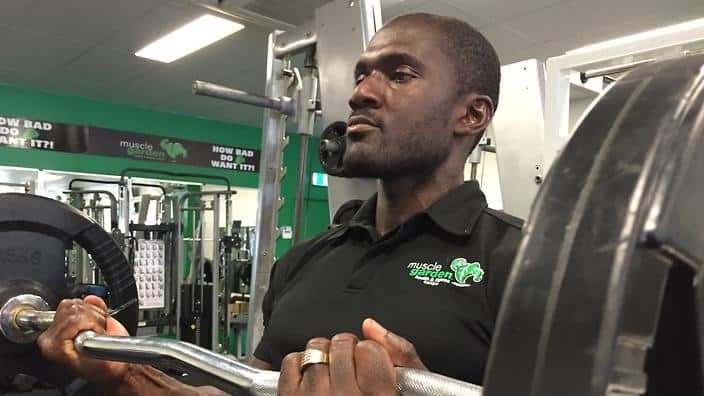Syrian refugees are welcome in central Queensland city of Mackay, hit hard by an economic slump due to the falling price of coal.
North Queensland regions have been proposed as a prime location for some of the 12,000 Syrian refugees under a federal government resettlement plan.
No specifics have been announced by the federal government but Queensland says it will take up to 3500.
In Mackay, more than 2000 houses stand empty, unemployment is 7.3 per cent and economic prospects are limited.

Kay Nyenuh was a Liberian refugee who arrived six years ago and now runs a successful fitness business on Mackay’s main street.
“It’s great and it has been great the whole time I’ve been here, except the economic downturn we’re going through,” he said.
“Those people [refugees] are going to need education, going to need housing, buy groceries and they’re all things local businesses are going to benefit from. To be honest, I wouldn’t mind a few Syrian refugees attending my gym.”
Mr Nyenuh employs a local at his Muscle Garden gym.
The federal government will spend about $700 million resettling 12,000 Syrian refugees - about $58,000 each.
“From an economic perspective it totally makes sense," head of the Mackay Chamber of Commerce, Kylie Porter said.
"We genuinely just need more bums on seats.
“It’s a numbers game. To resettle 100 people into this region directly benefits the local businesses.”
But not everyone wants to see Syrian refugees in Mackay.
“If there’re no jobs for locals to fill, where are there going to be jobs for Syrian refugees to fill,” local federal MP George Christensen said.
“For the Mackay region, it’s just not an economically conducive time. Not here, not right now and if you talk to most people on the street and they will tell you exactly that.”
Mr Christensen recently addressed a Reclaim Australia rally and has hardened his view of Syrian refugees.
“My stance has changed since the Paris attacks and I fundamentally believe we should reconsider the intake.”
“The number one duty for governments is defence of the nation and to protect its citizens, and if there is any possibility that there is amongst an intake just one rogue who is going to commit a terrorist atrocity like in France, if there is that risk, suspend it, don’t do it.”
Mr Christensen is right, not everyone on the streets of Mackay agrees.
“This thing, ‘because they’re Muslim, they’re going to come here and blow us up’, I think that’s a very wild generalisation,” said Mr Nyenuh.
Mackay’s economy was built on the back of foreign labour, mainly South Sea Islanders, Italians and Maltese.
Muslims first arrived in the 1880s from south-east Asia to work on the gold and sugar cane fields.
“We have lived very peacefully and in harmony, we haven’t gone through any serious trouble or any misunderstanding,” the President of the Islamic Society of Mackay, Waheed Haider, said.
“Some (refugees) might open a restaurant and offer Middle Eastern food not available to us.
“We have become an integral part of this community and provide whatever support we can to take it forward.”
The small Muslim community now includes people from Pakistan, Nigeria and Bangladesh who arrived more recently on 457 visas to work as doctors, engineers and marine pilots.
“They’ve made a great contribution," Mr Christensen said.
"I know them personally, I’ve celebrated Ramadan with them at the mosque or at the Islamic centre.
“They’re everyday Australians. Like most people call themselves Sunday Christians, these people are Friday Muslims. You don’t see the extreme Islamist, the pro-Sharia bent.”
Mackay only has a very small number of resettled refugees like Mr Nyenuh, and there are fears about what could happen if large numbers are brought to the city.
“I’m not sure regional cities have the community infrastructure to service a refugee population,” Ms Porter said.
“We just want to make sure infrastructure is in place to support those people coming out of a crisis.”
Mr Nyenuh agreed current services are very limited and a big boost would be “vital” for successful refugee resettlement.
More support services would also create more jobs, in the short-term, he said.

